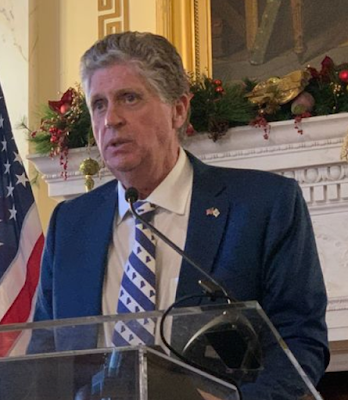In his budget, ideology undermines McKee’s response to the substance use crisis
By Steve Ahlquist in UpRiseRI
“It’s about helping people that are struggling and making sure that families get the help they are looking for,” said Rhode Island Governor Daniel McKee on Tuesday morning during a press conference at the Rhode Island Attorney General‘s office announcing opioid litigation settlements that will provide over $90 million in funding for state and local efforts to address Rhode Island’s opioid crisis. “We’re certainly determined to use these funds to make sure that we really make a difference.”
The governor stressed the importance of treatment, education and
preventative strategies in dealing with the crisis of substance use disorder.
To help deal with the opioid crisis, the Executive Office
of Health and Human Services (EOHHS) included a request to increase Adult
Substance Use Disorder (SUD) residential rates under Medicaid.
The item was included in the department’s 2022 Budget requests,
sort of a wishlist each department submits to the Governor each year outlining
their budget priorities. This year, of course, was special because of all
the American Rescue Plan Act monies coming in. Things that in the
past might not receive funding were more likely to be approved because of the
large influx of federal funds.
The problem right now is that Rhode Island has a limited number
of substance use disorder residential providers and long wait lists due to
Rhode Island’s low Medicaid reimbursement rates.
As noted in the EOHHS request, one large Rhode Island facility
is in receivership and there is “limited interest” in expanding services from
other suppliers, again due to low reimbursement rates “many of which have been
unchanged for numerous years [and] have not kept up with the cost-of-service
delivery… Low Medicaid reimbursement rates have also prompted some providers to
refuse or significantly restrict admission of Medicaid clients.”
“Without intervention,” says EOHHS in their request, “rates will
continue to fall behind the amount required to ensure service delivery, nor
will Rhode Island be able to attract additional [substance use disorder]
providers.”
The cost to Rhode Islanders to fill this request? $679,244. This
investment will unlock nearly $2million in additional federal
funds that will get Rhode Island on track towards expanding quality, American
Society of Addiction Medication (ASAM) services.
It will allow EOHHS the ability to “bolster, stabilize, and expand service delivery in SUD residential services. This can be achieved through rate increases and billing reform. Rate increases will ensure that SUD residential providers remain solvent and are adequately reimbursed for the cost-of-service delivery.” Additionally, “EOHHS need[s] to reform and standardize current billing processes to ensure that we can track service delivery by ASAM level, and that the data can be used to inform future initiatives.”
You can read the
proposal here.
Here’s the kicker though: Despite the influx of ARPA funds and
despite the opioid settlement dollars – this EOHHS item did not make it into
the Governor’s proposed 2022 budget. You wouldn’t likely have heard about this
proposal if UpriseRI hadn’t obtained a copy of the EOHHS budget wishlist items.
Why is the item not in the budget? It’s hard to know for sure,
but we do know that this is an incredibly conservative budget, and that
Governor McKee has extremely conservative advisers.
There is a hesitancy on the part of the Governor, House
Speaker Joseph Shekarchi and Senate President Dominick Ruggerio to
dedicate funds to new programs and new spending initiatives, however important
and even necessary they may be for securing quality medical care for those on
Medicaid.
These programs, once started, will still require funding in
future years, when federal monies may not be as forthcoming. But in that
future, people will still require quality medical care. And we will have to pay
for these services or allow people and families to suffer.
Currently, reimbursement rates are so low that when Rhode
Island’s Department of Behavioral Healthcare, Developmental Disabilities
and Hospitals (BHDDH) put out an RFP (request for proposals) with the
intention of creating new substance use disorder residential beds and to
improve access and reduce current wait times for admissions,
“Not one response was received from any provider during the
first release,” according to the EOHHS proposal. BHDDH released the RFP a
second time and “had one response from one provider who later dropped out [after]
inquiring about the current RI Medicaid reimbursing rates and length of stay
averages.”
Ignoring this needed program in his budget comes on top of the
Governor’s more genera cuts to Medicaid. These might not look like cuts, but
they are. Governor McKee’s budget holds the line on increasing Medicaid rates,
that is, he is not increasing them over the previous year, he is keeping them
level. In this time of high inflation, where the cost of everything – including
medical care – is rising, holding rates steady amounts to a cut in Medicaid.
This has been the third in a series of pieces about Governor
Daniel McKee’s proposed 2022 budget. See the first two here:
Surprise McKee
budget item exempts motorcycles from sales tax
Governor McKee’s budget proposes interest rate cut for tax delinquents
